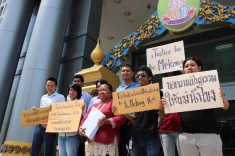Thai Court Holds Hope for Transboundary Justice in the Mekong

The closely-watched lawsuit filed by Thai Mekong communities against the Xayaburi Dam’s power purchase agreement (PPA) reaches a critical juncture Friday, as it is the final day that the Administrative Court will accept evidence into the case. It has been just over a year since the case was accepted by the Thai Supreme Administrative Court, in an unprecedented decision which signified the Court’s recognition of the importance of the Mekong River to lives and livelihoods of communities in Thailand, and the potential devastating transboundary impacts of the Xayaburi Dam, which have heretofore been denied by both the Thai project developer, Ch Karnchang, and the government of Laos.
July 24th marks the final submission of evidence into the case by the plaintiffs: 37 Thai villagers living in eight provinces of the Mekong from Chiang Rai to Ubon. It is then up to the Court to decide on a date for a hearing, where both the plaintiffs and the defendants - which include The Electricity Generating Authority of Thailand (EGAT) along with four other state agencies involved in the signing of the Xayaburi Dam’s PPA - will give testimony in person.
The lawsuit has become a regional case study, as it pioneers the use of legal mechanisms in holding government agencies and companies accountable for their involvement in cross-border projects and upholding the rights of local communities.
Such overseas investment, particularly in energy projects, is a trend which we are seeing progress rapidly in Thailand. In mid-June the Government of Thailand signed a Memorandum of Understanding with the Government of Myanmar to increase Thailand’s import of electricity from Myanmar by up to 10,000 MW, including through investment in a cascade of hydropower projects on the Salween River. Communities along the Salween are now facing an all-too-familiar struggle to those of Mekong communities in Thailand and throughout the region.
Amidst the influx of oversea investment in the region, particularly for Thai state-owned enterprises, banks and companies investing in neighboring countries, we are in critical need of laws which address the regional and transboundary implications of projects such as the Xayaburi Dam.
Thailand is promoting its banks, construction companies and energy industry to exploit natural resources - especially in Laos, Burma and Cambodia. While these countries may be rich in their natural resources, their laws are weak and space for the public and affected people to monitor these investments and participate in the decision-making process is severely limited, or in many cases non-existent. However, once the projects are developed, it is the people who will be most affected and who will have to bear the costs as project impacts are rarely properly mitigated or prevented, and the compensation provided is never enough to adequately restore lost livelihoods and cultures.
Our hope is that the Xayaburi Dam case will set an important precedent and act as a new mechanism to protect communities, their natural resources and the environment.
- In 2011, The Electricity Generating Authority of Thailand (EGAT) signed the Power Purchase Agreement for 95% of electricity generated by the Xayaburi Dam, which was based on approval by four other Thai government agencies.
- 37 plaintiffs composing of villagers living in eight provinces along the Mekong in Thailand from Chiang Rai to Ubon filed a lawsuit against five government bodies, including the National Energy Policy Council, the Thai Cabinet, and the Electricity Generating Authority of Thailand (EGAT).
- The lawsuit claims that approval of the project’s Power Purchase Agreement (PPA) is illegal under both the Thai Constitution and the 1995 Mekong Agreement. The PPA made between EGAT and the Xayaburi Power Company Limited, was approved without an assessment of the project’s transboundary environmental and health impacts and without consultations in Thailand, in volition of the Thai Constitution. The case was accepted by the Supreme Administrative Court in June 2014.
- In accepting the case, the Court stated that communities in Thailand “are entitled to participate in the management, maintenance, preservation and exploitation of the natural resources and the environment, in a balanced and sustainable manner, in order to enable themselves to live a normal life consistently in an environment that is not harmful to their health, sanitation, welfare and quality of life.”
Timeline:
- October 2011 – The Electricity Generating Authority of Thailand signs a Power Purchase Agreement with the Xayaburi Power Company Ltd to purchase 95% of the electricity from the Xayaburi Dam in Laos.
- August 7, 2012 – 37 villagers from communities along the Mekong River in North and Northeastern Thailand file a case with the Administrative Court in Thailand against five Thai Government agencies for their involement in the signing of the Power Purchase Agreement for the Xayaburi Dam.
- February 2013 – The Administrative Court deny jurisdiction to hear the case.
- March 2013 – The plaintiffs file a formal appeal with Thailand’s Supreme Administrative Court.
- June 24 2014 – Thailand’s Supreme Administrative Court accept the lawsuit.
- October 17, 2014 – Thai communities file an injunction with the Administrative Court calling for a halt to construction on the Xayaburi Dam while the Court rules on the case.
- July 24, 2015 – Final submission of evidence by the plaintiffs to the Court.



